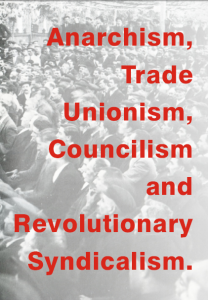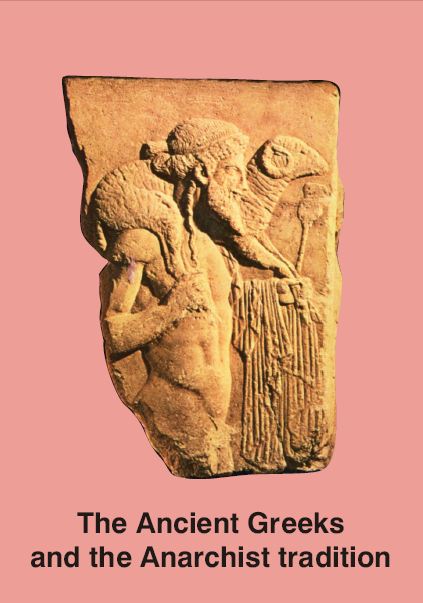 This third issue of Libertarian Anthology is devoted to the topic of trade unionism and the evolvement by one of the groupings within it to revolutionary ideals; whom ever has taken the patience to study both the economic and political development of society over the past two centuries will come to realise that the goals of anarcho-syndicalism did not evolve from unachievable utopic concepts conveyed by a few lunatic innovative goodhearted individuals, instead, these goals are the outcome of constant struggles within the maladjusted social conditions. As a result we have the pleasure in presenting the reader with a collection of articles which we hope will demystify the misunderstanding of anarcho-syndicalism.
This third issue of Libertarian Anthology is devoted to the topic of trade unionism and the evolvement by one of the groupings within it to revolutionary ideals; whom ever has taken the patience to study both the economic and political development of society over the past two centuries will come to realise that the goals of anarcho-syndicalism did not evolve from unachievable utopic concepts conveyed by a few lunatic innovative goodhearted individuals, instead, these goals are the outcome of constant struggles within the maladjusted social conditions. As a result we have the pleasure in presenting the reader with a collection of articles which we hope will demystify the misunderstanding of anarcho-syndicalism.
There has always existed at every cross point within any defined period in history the continuous dilemma for anarchists whether to belong to a trade organisation or not. This dilemma can be traced back to the perpetual conflicto within the anarchist ideology between the individualist and the collectivist and therefore it must be recognised that anarcho-syndicalism is not an accepted method of action by all anarchists.
There are many anarchists that agree with Edouard Dolleans’ opinion that the ideal of anarcho-syndicalism evolved from two incompatible concepts: anarchism which is revolutionary and syndicalism which is reformist, subsequently many anarchists hold the belief such fusion will be as impossible as water and fire.
Nevertheless, wherever the human drive intervenes anything is possible. Even with the admission that many struggles have been lost, one cannot deny the historical revolutionary force anarcho-syndicalism has been in many countries and the revival it is currently experiencing.
The various trends of anarcho-sydicalisms, and we use this term because there has been different schools of anarcho-syndicalism both within Europe and America, have not always seen eye to eye and on many occasions there has existed severe disagreements amongst these revolutionary syndicalist organisations of equal anarchist aspirations. During the 1920’s one could follow in the pages of “La Protesta” published in Buenos Aires (the journal of FORA –the Argentinean Regional Worker’s Federation- edited by López Arango and Diego Abad de Santillán), a continuous critique against all the European anarchosyndicalist organisations, including the spanish CNT as well as the revolutionary syndicalist IWW of the United States, because in the eyes of the Buenos-Airens these organisations failed to implement the puritan anarchist ideology.
When dealing with the topic of industrial unionism, the old anarchist militants can be neither apologetic of the past nor of a unionism that, if it had certain puritan glimpses has irretrievably lost them in the course of the last 80 years not only in Spain but in the entire world.
The Unions that anarchists have always proposed have no resemblance with the hierarchical structure of conventional trade unionism -be it catholic or any other religious denomination, Communist, Socialist or ALP controlled- nor does the organisational structure that anarchists seek can really continue to be called trade unions taking into account what contemporary unions represent in today’s social struggles. Anarchists nevertheless recognize the need to continue calling them as such, because what really matters is both its internal and external functioning as well as its purpose as an association of workers. The Union that anarchists propose to the workers of the world is a federalist self-managed union and one that exercises its right of direct action. The Union is the workers antihierarchical organisation through which workers can emancipate themselves, this is the reason why anarchists join a union. Anarchists do not join the union to build trade unions, to take over, to establish a career path or to participate in the union bureaucratic plans to conquer economic advances exclusively within the framework of the present State orientated society, -and the reality is that they can not work within hierarchically structured unions- instead, anarchists join the union with the project to destroy the State, to lay the foundations of a society with no bureaucracy, without privileges and without authority. Anarchists also realise that the economic demands -both social and materialistic- are requirements for the incorporation of the workers to fight for the defence of their interests. Knowing this, anarchists do not underestimate the mobilization that such a struggle generates; instead anarchists support these struggles with the added emphasis on the importance of a revolutionary action against both the State and Capital. Anarchists do not see the industrial struggle as a separate objective; quite the opposite, it is seen as a necessity of the anti-authoritarian struggle within this society against the exploitation of the workforce by the capitalists. There is no possible separation of industrial struggle and revolutionary struggle, an issue that anarchists have always clearly articulated.
Revolutionary syndicalism or anarcho-syndicalism evolves from the basic principles that the daily demands of labour against capital must be made revolutionarily, that is, with an emphasis on those contradictions that make both concepts an incompatible matter. To only propose the realization of economic benefits as the goal of any struggle or confrontation between workers and employers and negotiating on behalf of the workers without their direct participation, is in itself the tactic of “intermediary” trade unionism. It is not only economic benefits which workers require when taking into account the inflationary increases to the cost of living, but also the awareness and consciousness that workers themselves acquire and develop when resolving their own problems without the need to refer them to committees of specialists or arbitration commissions who miserably waste everyone’s time arguing over a couple of dollars when in fact it is society that needs to be changed so that production, technology and the exchange of labour can be managed by the workers themselves, for they are the ones that perform the actual process of production on a daily basis.
Anarcho-syndicalism is neither an instrument nor an appendix of anarchism. It neither functions nor depends upon the blessings of a “central committee”. It has undeniable and indestructible anarchist roots – which constitutes one of its most essential reasons for existing and therefore the best guarantee for its independence.
One of the characteristics and more significant virtues of anarcho-syndicalism is the absolute respect to the personality of the individual affiliate, whom, is constantly encouraged to participate on a voluntary basis in the life and in the progress of the Union, its sections, its federations, in other words the organization in general; to assume their own responsibilities; to freely expose their ideas and opinions, and to make choices and decisions in meetings; to participate directly in the activities and in the struggles; to put into practice those decisions agreed upon by general consensus.
In an anarcho-syndicalist union decisions are made at “grass root” level in an assembly. Positions of delegates or representatives are subject to a limited tenure (depending upon the position the period can vary between six to twelve months) and the holders of these positions can be recalled at any time; both bureaucracy and leadership are rejected.
Anarcho-syndicalism argues that neither freedom nor social justice can exist within a society based on classes, and that the fundamentals of such a society perpetuate and enshrine the division of people. Furthermore, any reform that does not destroy these foundations will not change the conditions for workers, who will continue to be oppressed and exploited. As a result it opposes; the collaboration of classes, the concept of co-management and rejects the political intervention in capitalist industry. There is an absolute incompatibility between anarcho-syndicalism and the state-capitalist system.
In accordance with its anti-authoritarian principles anarcho-syndicalism is anti-parliamentarian for it considers that such an institution will be absolutely ineffective in the emancipation of the working class. The historical reflection of achievements by these so called working-class political parties be they socialist, marxist or of democratic denomination who from almost the mid-19th century to the present day, have come to gain absolute majority and form Governments in certain periods and places, as we have thus seen in Germany, England, France, Sweden, Norway, Denmark, Australia and in so many other Nations, have more than eloquently demonstrated the absurdity and the unproductiveness of their representation in defence of the working class.
Anarcho-syndicalism conveys the inevitable reality that once a political party assumes control of government, no matter how it may define itself, the mechanisms and forces prevailing both within it and the entity of government, diverts it to serve the interest of capitalism and the State, on behalf of the “national” interest and at the expense of the working class.



